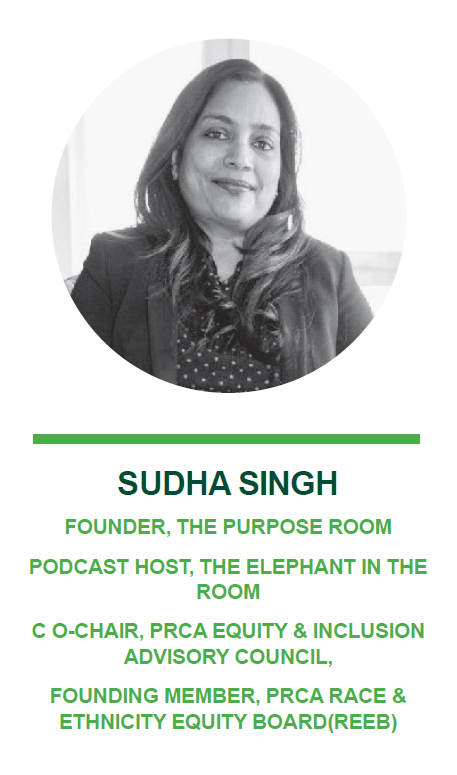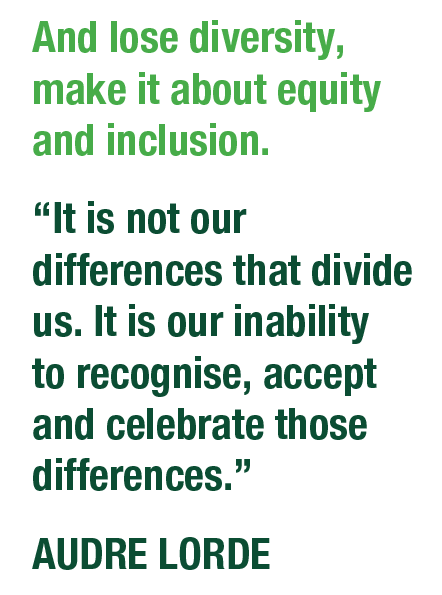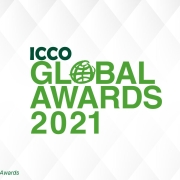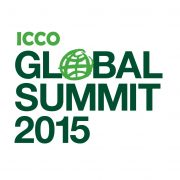A Time For Authenticity and Action
Extracted from the 2021-22 ICCO World Report.

Sudha Singh’s thought provoking reflections on diversity, equity and inclusion are featured in the 2021-2022 ICCO PR World report.
As I review the data from ICCO’s World PR Report, I sit with the awareness and understanding that countries and cultures are not homogenous, they are different and unique. That when we speak about diversity, equity and inclusion (DEI), we are at different points in our journey; sensitivity and awareness levels may wildly differ from country to country within a region or a continent. It is important to understand that priorities differ from country to country and sometimes in the same country the drivers of DEI differ from one region to another.
The US and UK – parts of the West that were roiled [in 2020] after the brutal murder of George Floyd and ‘Black Lives Matter’ (BLM) – and Latin America fared poorly on the question of ethnic representation. The US was at 3.6 and the other two at 4.1. The key takeaway here is that there is heightened awareness and recognition of the inequalities in these geographies which is great, because it means that there is an acknowledgement of a) the problem and b) the need for urgent change.
This is further reflected in the fact the same three countries score highest on firms that have a diversity and inclusion policy with the US at 71% followed by Latin America(62%) and UK(60%).
However, there seems to be worrying shift though in the Middle-East, Asia-Pac, and Africa if we compare with last year’s data: representation of ethnic minorities has gone down in percentage terms. Surprisingly Western Europe fares the worst amongst the eight regions surveyed and we need further data to understand why that is. Overall, the data is indicative of the absence of sub-stantive progress across countries/corporates and that may very well be due to the fact that in the past 18 months companies have paused to reflect and review their efforts in the direction. Or that most corporates have been fairly oblivious to systemic inequalities. It is encouraging to see that a large number of those surveyed review their policy at least once a year if not more.
The DEI agenda in the West was propelled by the horrific murder of George Floyd, BLM and the pandemic that exacerbated racial and ethnic inequalities. It required seismic events to spotlight the trials and tribulations of marginalised communities.
The impetus in some regions/ countries is regulatory requirements and for many companies it gets to the top of the agenda because of the associated business and reputation risks. In India for example the conversation centres largely on gender; the LGBTQ agenda comes to the fore at multinationals – where DEI policies at the HQ become the trigger points in local markets. Western multinationals have the power to enable positive change in the countries and communities where they operate.
However, it is critical to keep in mind that companies must not try to force fit their policies in local markets, they must be mindful of local realities and engage with teams and experts to identify priorities or focus areas.
The last 18 months has laid bare the stark inequalities in our world. As we slowly move towards recovery, the outlook is fairly positive for our industry. This has also been a time for the sobering realisation that we are failing abysmally on representation, equity and inclusion, and the consensus all around is that it will require transformative changes if we are to build a fairer industry. For businesses as they struggled with aftershocks, it has been a time to align their core purpose to broader societal needs, listen to their stakeholders, take a stand on important is-sues and not just because of share holder imperatives. CEOs and the C-suite are grappling with the pace of change, to adapt, and understand whatever state of flux we are in at that point in time. For an industry that aspires to have a seat at the table, and advise clients on purpose and sustainability, this puts us on the back foot. How can we advise clients authentically if we as an industry are not equitable or inclusive?
As we look to the future it is important to think about what we can do to build a better and fairer industry. We can start by creating awareness about best practice through setting benchmarks and making cultural intelligence a key skill for all practitioners. According to a recent article in Forbes, the rise of awareness about diversity and inclusion has been one of the most transformative cultural trends of the last 10 years. How can we ride this wave, and what can we do to take advantage of the momentum?
Prioritise on just two things:
- a) Be Authentic
- b) Take Action
 To be authentic live the values that we preach. Don’t just say it to other people or for your clients, embed inclusion into your business. Start with C-Suite buy in and accountability; listen to your employees and stakeholders; create an inclusive hiring process; be transparent about the pay gap; consider intersectionality; be a sponsor and monitor constantly.
To be authentic live the values that we preach. Don’t just say it to other people or for your clients, embed inclusion into your business. Start with C-Suite buy in and accountability; listen to your employees and stakeholders; create an inclusive hiring process; be transparent about the pay gap; consider intersectionality; be a sponsor and monitor constantly.
Take Action: Before you head to the next conference or write the next blog on equity and inclusion check your equity and inclusion policy. If you have one, map where you are on the journey; share your journey including your challenges. If you are not on the journey, get started.












